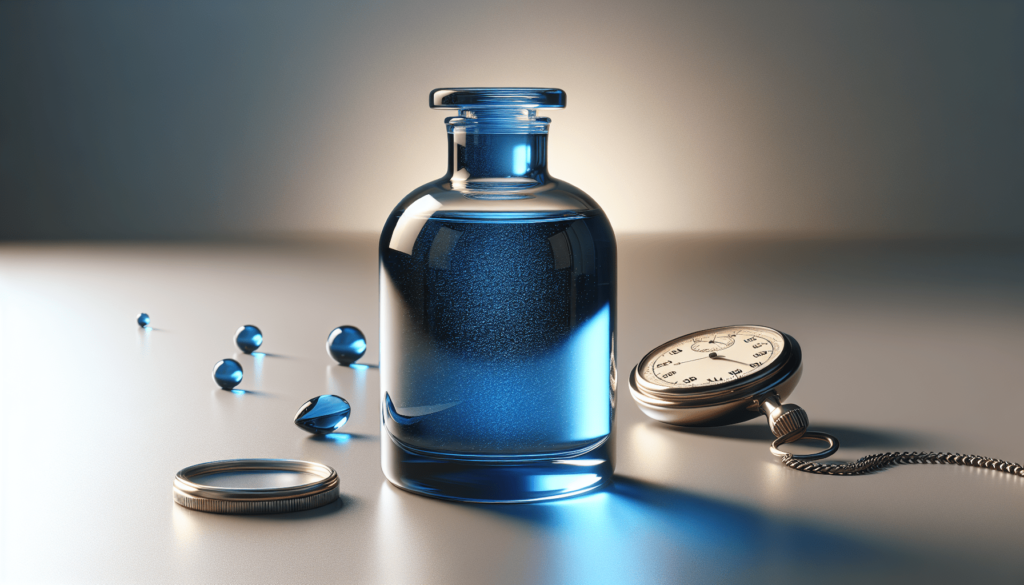
Have you ever wondered how long a substance stays in your system after you’ve taken it? It can be a bit of a mystery, can’t it? Particularly when that substance is something like methylene blue.

What Is Methylene Blue?
Methylene blue is a synthetic chemical compound that’s been around for over a century. This vibrant blue dye isn’t just for coloring fabrics or giving a pop to your arts and crafts—it’s got some serious medical applications too. Originally used for treating malaria, it’s now often found in the medical field as a treatment for methemoglobinemia, a condition where the blood cells can’t effectively carry oxygen.
You may also come across it in various laboratory experiments and in certain instances, as an antidote for certain types of poisoning. Its intriguing qualities make it valuable, but if you’ve recently been exposed to it or perhaps used it yourself, you might be wondering how long this dye stays in your system.
How Does Methylene Blue Work in the Body?
Understanding how methylene blue works is key to figuring out how long it lingers in your system. When you take methylene blue, it enters your bloodstream and binds to cells. Once in your system, it starts to interact with hemoglobin (the protein that carries oxygen in your blood), potentially converting methemoglobin back to hemoglobin.
The speed at which your body processes methylene blue will depend on several factors, including your metabolism, age, and overall health.
Factors Influencing Clearance Time
Just like you won’t finish a puzzle in the same amount of time as your friend, the rate at which your body clears methylene blue varies among individuals. Here are some factors that can influence how long it stays in your system:
1. Metabolism
Your metabolic rate is a significant factor. If you have a fast metabolism, your body may eliminate methylene blue quicker than someone with a slower metabolism. It’s all about how efficiently your body’s systems work together to process and eliminate substances.
2. Dose Taken
Dosage plays a crucial role in determining clearance time. If you took a standard dose for medical treatment, it might clear out faster than if you used a larger dose for a different purpose. The body works unusually hard to process larger doses, potentially slowing down clearance.
3. Hydration Level
Hydration can influence many bodily functions, including how substances like methylene blue are eliminated. If you’re well-hydrated, your kidneys may effectively flush out substances more efficiently, potentially reducing the time methylene blue stays in your system.
4. Age and General Health
You might find that age impacts how substances are processed. Younger individuals may metabolize methylene blue more effectively than older adults. Additionally, if you have preexisting health issues—especially involving liver or kidney function—you may find that your body takes longer to clear out certain chemicals.
Duration for Methylene Blue to Leave the System
Now that you have an understanding of the influencing factors, let’s dig into the nitty-gritty of how long it actually takes for methylene blue to clear out of your system.
Half-Life of Methylene Blue
The elimination half-life of a substance is the time it takes for half the amount of the drug to be removed from your bloodstream. For methylene blue, the elimination half-life is generally around 5 to 6 hours in healthy adults. This means that after about 5 to 6 hours, half the dose you’ve taken is gone from your system.
However, it can take multiple half-lives for the substance to be entirely eliminated. In practical terms, this generally translates to methylene blue being expelled from your body entirely within approximately 24 hours after you take a single dose.
Factors Affecting Half-Life
While the half-life provides a solid baseline, remember that various factors could either lengthen or shorten this period. If you’re not a healthy adult—like if you’re older, have liver/kidney issues, or are taking other medications—your half-life could stretch longer. Also, the method of administration (oral, intravenous, etc.) can affect how fast your body processes the dye.
Protective Mechanisms in the Body
Your body has an incredible ability to eliminate substances through various means, such as metabolism and excretion. Methylene blue may undergo metabolic reactions in the liver, which alters it into other compounds that are easier for your body to excrete. It’s remarkable how your liver and kidneys work tirelessly to help keep you healthy and remove excess substances.

Symptoms and Side Effects of Methylene Blue
While you’re figuring out the clearance time, it’s also important to discuss the possible side effects of methylene blue. Sometimes the process of elimination can trigger some uncomfortable symptoms. Here’s what to look out for:
Common Side Effects
-
Urine Discoloration: One of the most recognizable side effects is that methylene blue can turn your urine a bright blue or green color. It’s a harmless but startling effect.
-
Nausea and Vomiting: Some people might experience gastrointestinal discomfort. If you start feeling sick, it could be related to methylene blue, particularly if the dosage was higher than normal.
-
Headaches: This compound can also cause headaches in some individuals. If you’re prone to headaches in general, this might enhance your discomfort.
Serious Side Effects
While rare, there are some serious side effects that should not be ignored:
-
Allergic Reactions: If you experience difficulty breathing, swelling of the face or throat, or hives, seek immediate medical attention.
-
Serotonin Syndrome: If methylene blue is combined with certain antidepressants, it can lead to this harmful condition. This is characterized by symptoms such as confusion, rapid heart rate, and increased blood pressure.
What Should You Do If You Suspect Side Effects?
If you think you’re experiencing side effects from methylene blue, it’s essential to take it seriously. Consult with a healthcare professional who can offer advice tailored to your specific situation.
How to Support Your Body in the Elimination Process
There are several things you can do to help your body eliminate methylene blue more effectively if you’ve recently used it. Here are some tips:
1. Stay Hydrated
Increasing your water intake can be beneficial. Proper hydration supports kidney function, which plays a crucial role in flushing out substances from your body.
2. Eat Balanced Meals
Fuel your body with a variety of nutrients—fruits, vegetables, lean proteins, and whole grains. A well-balanced diet can support your liver and overall health, potentially aiding the elimination process.
3. Avoid Alcohol and Heavy Foods
While your body works to clear methylene blue, it’s a good idea to steer clear of alcohol and heavy, greasy foods that could put additional stress on your liver and kidneys.
When to Seek Medical Advice
If you’re unsure or anxious about methylene blue’s effects on your body, it never hurts to reach out to a healthcare provider. They can give you personalized information, and if necessary, conduct tests to see how your body is responding.
Final Thoughts
Your body is a remarkable machine, capable of processing many substances, including methylene blue. While it typically clears out within 24 hours, remember that multiple factors could influence this timeframe. Nutrition, hydration, and overall health play crucial roles in how quickly your body can eliminate this chemical.
Keeping an open line of communication with a medical professional can help navigate any concerns and ensure you’re on the right track. If you find yourself questioning, “how long does it take for methylene blue to leave my system?”—you now have the tools to inform yourself about what might be in store.
Now that you’re armed with knowledge, stay curious, and lookout for what your body tells you. Your health deserves your attention and care, after all.